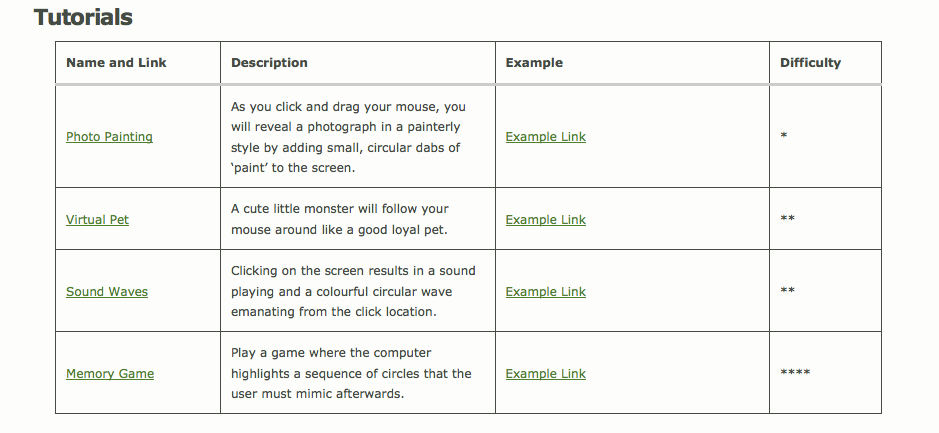Last weekend I taught a one-day workshop called 'Create Interactive Art and More! Learn to Program with Processing.' I developed the materials from scratch for the workshop and hope to use them again. Overall the day went quite well, but as always, there are things to improve.
In the morning, I did a round of intros from the group. This was for two reasons: first, to allow those who were late to make their way in (the weather wasn't great and even I had a hard time finding the door to get in), and second to build a sense of community. Although this took a little longer than I would have liked, it seems that both goals were met. I had some students say how great it was to see how many other non-programmers and artists were there.
The morning largely involved me talking about a programming concept using some analogy, and then getting the students to type in some example code. I had them play around with the specifics of the code to learn about how Processing worked experimentally rather than just hearing me describe the syntax.
This worked fairly well, though there were times I would have liked to move on a bit quicker. One challenge was getting everyone's attention while they were playing with code. Sometimes the TA's would continue helping someone even when I wanted to tell the class something; next time, I should be sure to ask the TA's to pause for a bit when I need to move on. The analogies themselves seemed to work well.
In the afternoon, I had some programming concepts to finish covering. Next time, I should schedule more than two hours for this portion of the workshop.
After the formal part, I got the students to look at four tutorials I had written up. To make the tutorials, I had first programmed four little projects in Processing, then tried to put myself in a beginner's shoes to describe the steps to writing the code.
I tried to keep the tutorials fairly simple, though my last tutorial for a memory game ended up being much more complex. I decided to finish the tutorial for that one anyway just in case there were some folks who had programmed before (and there were).
My goal in writing the tutorials was to entice the students to ask questions during the class. I wanted to use a 'just-in-time' teaching technique where things would come up as questions the TA's could help with while they worked through the tutorials. So there were definitely things in the tutorials that weren't discussed much or at all in the formal portion of the workshop.
However, it seems that my tutorials weren't quite clear enough. Students had a bit of trouble knowing exactly what to do if they hadn't programmed before. So, since the workshop has ended, I have modified all but the memory game tutorials, adding specific, highlighted instructions on what to do.
My course notes and tutorials are all available online so the students can try them after the workshop as well. If you'd like to give Processing a try, or just see whether I've done a good job with the tutorials, I'd love to have you look at them and post feedback as a comment here on the blog.
I'm hoping to collect some more data on how well the workshop went through a survey I sent out to the participants. It has been challenging to get many responses, but hopefully they'll continue to come in. I am already considering running the same workshop (with improvements) next semester, perhaps targeted toward students, so hopefully I can get some more data then as well.




0 comments:
Post a Comment
Comments are moderated - please be patient while I approve yours.
Note: Only a member of this blog may post a comment.